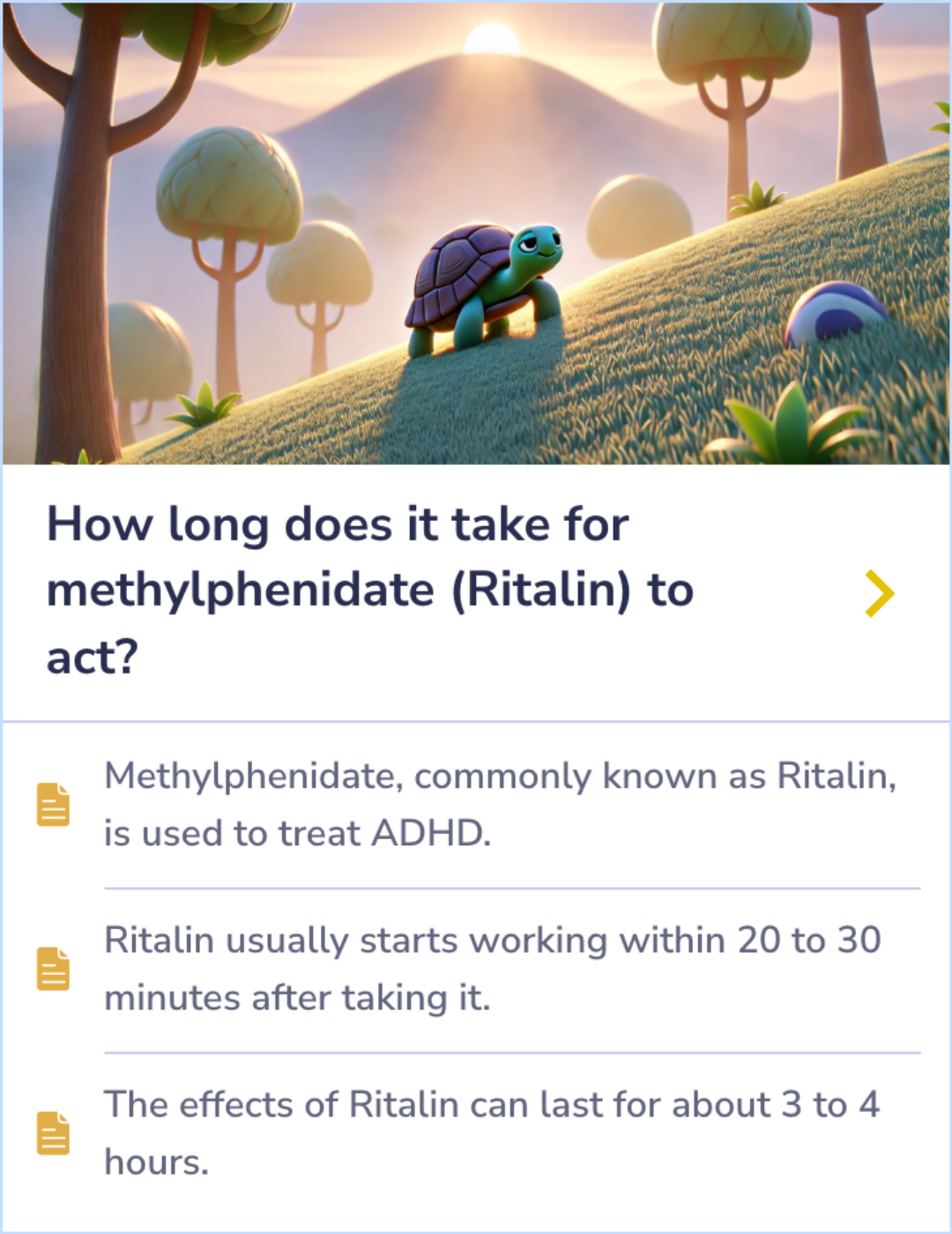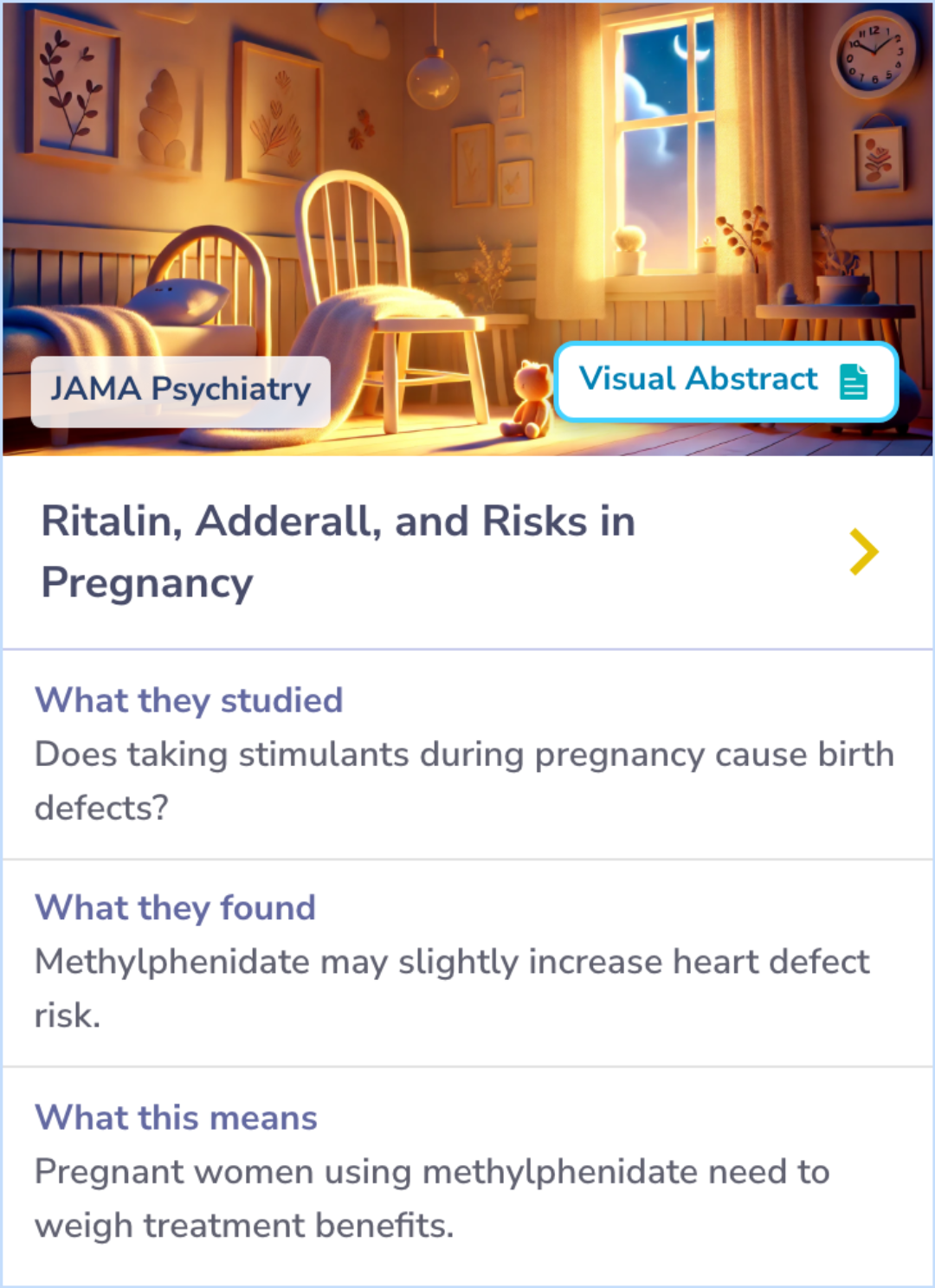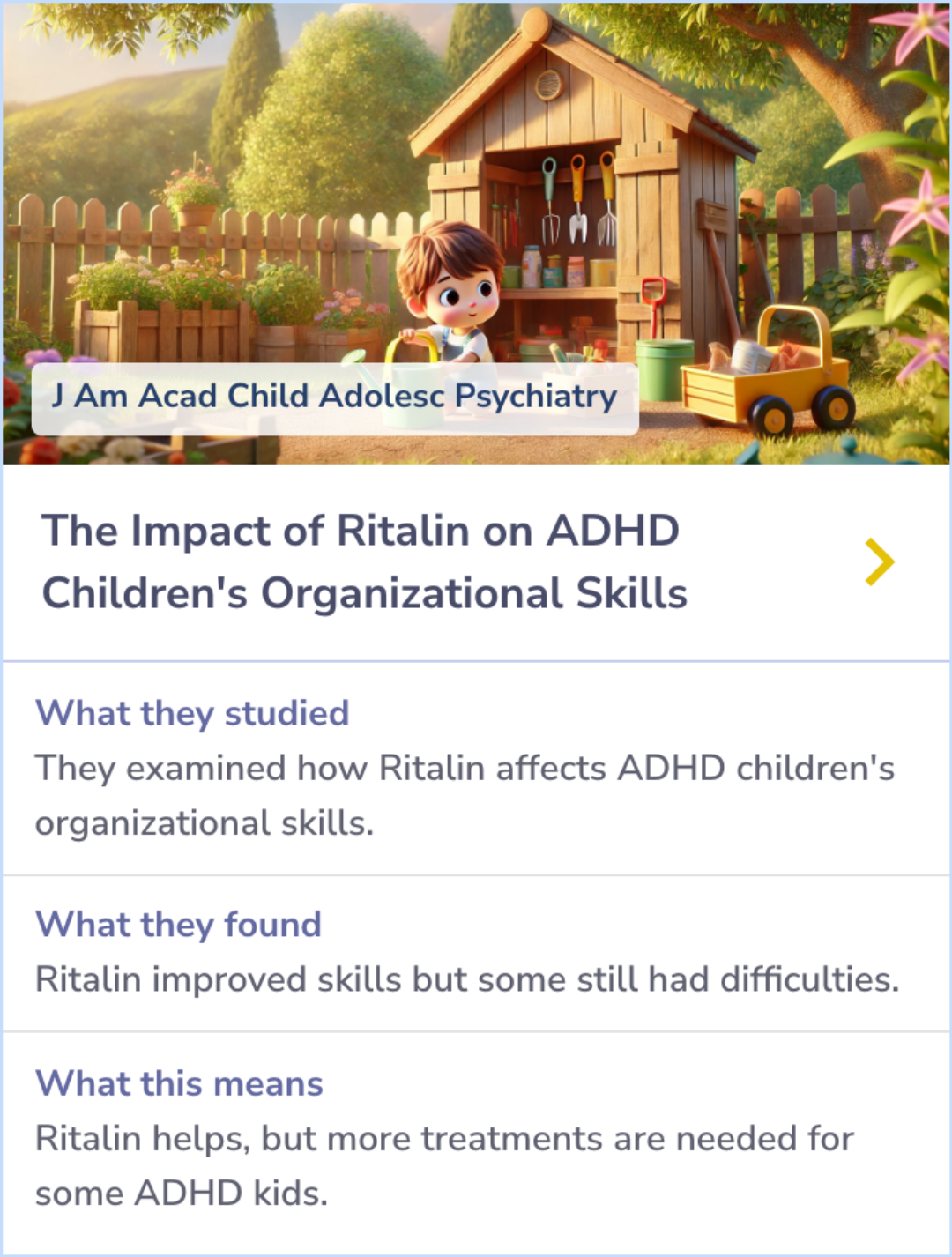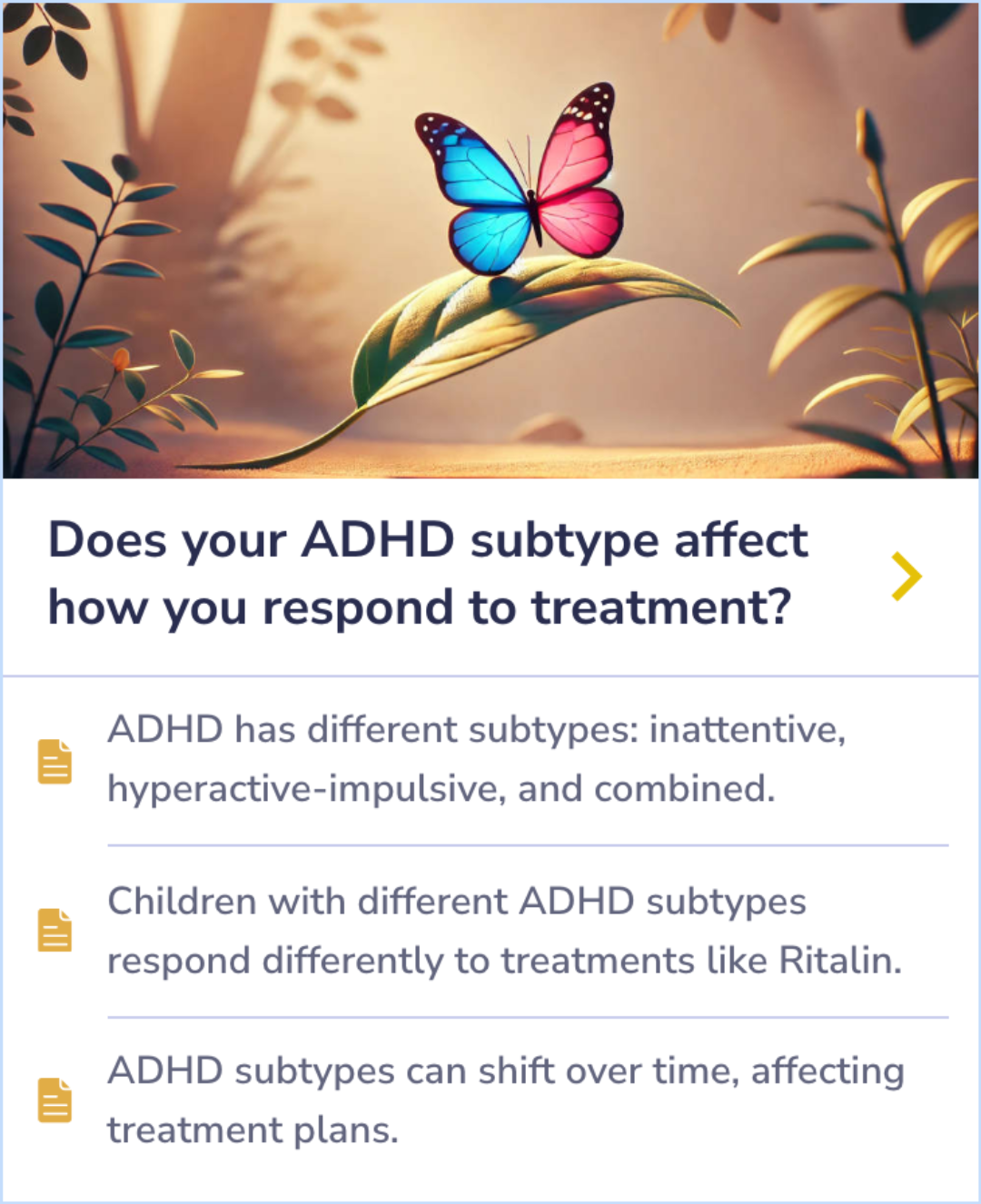Ritalin
Evidence Based Answers
How does food affect Ritalin?
Published: September 10, 2024
Studies Summary
⏳
Food Slows Ritalin Absorption
When Ritalin-SR is taken with food, it gets absorbed slower. This means the medicine takes longer to start working compared to taking it on an empty stomach.
🍽️
Impact of Food on Ritalin and Ritalin-SR
Food affects how quickly Ritalin-SR is absorbed, but the overall amount absorbed remains similar to regular Ritalin tablets. The difference in absorption rates doesn't change the total effect.
⏰
Best Time to Take Ritalin
Taking Ritalin 30 to 45 minutes before eating helps avoid delays in absorption. This timing can help ensure the medication works more effectively.
Impact of Food on Ritalin's Onset
The absorption of Ritalin (methylphenidate) can be influenced by food, particularly meals high in fat, which may delay the onset of its effects. For instance, taking Ritalin with a large or fatty meal might slow down how quickly it starts working, meaning the effects could take longer to begin.
This delay could be crucial if quick symptom control is needed, making it advisable to take Ritalin 30 to 45 minutes before meals for more predictable results.
This delay could be crucial if quick symptom control is needed, making it advisable to take Ritalin 30 to 45 minutes before meals for more predictable results.
“
Source Quotes:
Administration with a high-fat meal may delay the onset and increase peak concentrations of some formulations.
After oral administration, methylphenidate is almost completely absorbed… Peak plasma concentrations (Cmax) occur 1 to 3 hours (Tmax) after an oral dose.
How Food Influences Ritalin Absorption
Taking extended-release Ritalin (methylphenidate) with food can increase the amount of the drug absorbed into the bloodstream. This means more medication is available for the body to use, and it may reach peak concentration faster.
For example, when Ritalin is taken with a meal, its effects might be noticed sooner compared to taking it on an empty stomach. However, the type of food, particularly if high in fat, could still delay the onset, even if absorption is enhanced overall.
For example, when Ritalin is taken with a meal, its effects might be noticed sooner compared to taking it on an empty stomach. However, the type of food, particularly if high in fat, could still delay the onset, even if absorption is enhanced overall.
“
Source Quotes:
Absorption seems to be enhanced when methylphenidate is taken with food…
Protein binding of methylphenidate is low.
Meal Timing and Ritalin's Effectiveness
The timing of meals can affect how well Ritalin (methylphenidate) works. It is often recommended to take Ritalin 30 to 45 minutes before meals for better absorption. Taking it with food might slow this process, causing the medication to take longer to start working.
For instance, if Ritalin is taken just before a meal, the absorption might be delayed, which could be a concern if quick symptom control is needed. This highlights the importance of meal timing when planning medication schedules.
For instance, if Ritalin is taken just before a meal, the absorption might be delayed, which could be a concern if quick symptom control is needed. This highlights the importance of meal timing when planning medication schedules.
“
Source Quotes:
Administer in divided doses 2 or 3 times daily, preferably 30 to 45 minutes before meals.
Current clinical practice calls for the administration of methylphenidate 30 to 45 minutes before meals…reduce its potency.
Variability in Ritalin Absorption
There is significant variability in how Ritalin (methylphenidate) is absorbed by different people. Some individuals might not notice much change when taking it with food, while others could experience a delay or reduced effectiveness.
For example, one person may not see any difference when taking Ritalin with food, while another might find that it takes longer to work. This variability underscores the importance of following prescribed instructions carefully.
For example, one person may not see any difference when taking Ritalin with food, while another might find that it takes longer to work. This variability underscores the importance of following prescribed instructions carefully.
“
Source Quotes:
There is considerable interindividual variability in methylphenidate absorption rate…rate constant 1.83 +-1.5 (SD) h-1 for 0.34 mg/kg.
Key Takeaways
Conclusions
The absorption of Ritalin (methylphenidate) in the body can be influenced by food. When taken with food, Ritalin-SR (sustained-release) tablets may take longer to reach peak concentration compared to taking them on an empty stomach. This delay affects the timing of the medication's effects.
Despite this delay, the overall absorption of Ritalin-SR remains similar to regular Ritalin tablets, and the total amount absorbed is not significantly altered by food intake. Timing the medication around meals can help manage these effects and ensure optimal absorption.
Further studies are needed to fully understand the impact of food on methylphenidate absorption, as current findings vary across different populations.
Despite this delay, the overall absorption of Ritalin-SR remains similar to regular Ritalin tablets, and the total amount absorbed is not significantly altered by food intake. Timing the medication around meals can help manage these effects and ensure optimal absorption.
Further studies are needed to fully understand the impact of food on methylphenidate absorption, as current findings vary across different populations.

Evidence Summary
Timing the Effects of Ritalin
Ritalin starts working quickly, usually within 20 to 30 minutes, making it a reliable option for managing ADHD symptoms throughout the day. The effects typically last around 3 to 4 hours, providing a manageable window for daily activities.
Knowing the timing of Ritalin’s effects is key to planning a schedule that maximizes its benefits without unexpected gaps in symptom control.
Knowing the timing of Ritalin’s effects is key to planning a schedule that maximizes its benefits without unexpected gaps in symptom control.
Evidence Summary
Potential Risks of Stimulants During Pregnancy
A study of over 4 million pregnancies from the US and Nordic countries found that methylphenidate, commonly used for ADHD, might slightly increase the risk of heart defects in newborns when used during pregnancy. However, no increased risk was found for amphetamines.
Data from the US showed higher rates of congenital malformations for infants exposed to methylphenidate compared to those unexposed, with similar findings confirmed in Nordic data.
Data from the US showed higher rates of congenital malformations for infants exposed to methylphenidate compared to those unexposed, with similar findings confirmed in Nordic data.
Evidence Summary
Impact of Medication on ADHD Children's Organizational Skills
Nineteen children with ADHD participated in a study to see how a stimulant medication, MPH-OROS, affects their organizational, time management, and planning skills, often challenging for them. Over several weeks, parents and teachers assessed improvements.
Results showed significant improvements in these skills and reduced ADHD symptoms, although 61% of the children still struggled with certain organizational tasks even with the medication.
Results showed significant improvements in these skills and reduced ADHD symptoms, although 61% of the children still struggled with certain organizational tasks even with the medication.
Evidence Summary
How Meals Impact Ritalin Absorption
Large meals can slow down how quickly Ritalin starts working, delaying the onset of its effects. For example, a big breakfast might mean you wait longer to feel the medication kick in.
Timing matters too. Taking Ritalin 30 to 45 minutes before eating can help with better absorption. Eating right after taking it can slow this down, causing a delay in symptom control.
Different people absorb Ritalin differently. Some notice delays with food, while others don't see much change, highlighting the importance of following your doctor's advice.
Timing matters too. Taking Ritalin 30 to 45 minutes before eating can help with better absorption. Eating right after taking it can slow this down, causing a delay in symptom control.
Different people absorb Ritalin differently. Some notice delays with food, while others don't see much change, highlighting the importance of following your doctor's advice.



